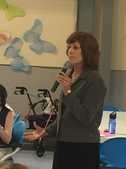|
Getting together with friends is fun, but did you also know it has health benefits? The holidays are coming up and instead of getting consumed with the hustle-bustle, take time just to enjoy feasting and socializing with others. “Gathering is good for our body and our spirit” (https://www.nytimes.com/2019/11/18/smarter-living/holiday-meals-family-tips.html). Even though it may seem obvious, researchers have concluded that social connection is good for our health; so turn around your thought process this holiday season and instead of feeling like there are too many bad habits related to the holidays, eat, drink, and be merry! A healthy diet and exercise are important prescriptions for good health, but so is our social connection. For those of you who enjoy alone time – no worries. Social connection is about quality time, not quantity. On the other hand, social isolation is risky business, with researchers concluding that it is equal to the physically-linked risk factors of smoking, obesity or lack of exercise (https://www.ncbi.nlm.nih.gov/pmc/articles/PMC3150158/). A more apparent observation is that social connection leads to better mental health; people are less depressed and less anxious when they stay connected (The Happiness Track, by Emma Seppala).
What is the meaning of social connection? Researchers define it as: “the feeling that you belong to a group and generally feel close to other people. Scientific evidence strongly suggests that this is a core psychological need essential to feeling satisfied with your life” (http://www.liherald.com/islandpark/stories/the-power-of-human-connection,102632). Dr. J. Martino et al – in their 2017 study addressing the power of human interaction – characterized social connection as a “dose of the human moment—a positive contact with other people.” As with Maslow’s Hierarchy of Needs, social connection is considered a vital human need, and it is now utilized as treatment and prevention, along with medical therapies, for various health conditions such as depression, obesity, anxiety, addictions, etc. (https://www.ncbi.nlm.nih.gov/pmc/articles/PMC6125010/). How powerful is social connection?
What about our connection with our physicians and other healthcare providers? Doctor-patient relationships have changed and we need to be mindful of maintaining a connection. We see more specialists, more tests are done, computers are being utilized more in health settings, and hospitalists (instead of our own doctor) see us when we are hospitalized. Although these advancements improve our health in some ways, they also lead to being more distanced from our doctors. For example, it’s great that our medical history is stored in the electronic medical record for easy access to our providers, but it also tends to lead to less “face-time” with our doctors. The advanced technology with equipment and testings have helped in the advancement of our treatments, but this also takes away from the basics of being “touched and examined” by our doctors. Having hospitalists, who are better trained to deal with patients in the hospital setting, is an asset, but we also lose the connection of our primary physician (who knows us well) being with us when we are hospitalized https://www.health.harvard.edu/blog/keeping-the-human-connection-in-medicine-2016121210837. In conclusion, we need to seek a balance of utilizing the advancements in medicine wisely and still maintaining our connection with our doctor and other providers. Interesting that social connection is part of town planning. Although town planning has changed as a result of economics, people’s interest in downsizing, desire to be within walking distance to schools, stores, restaurants etc., there is also a link to social connection. I have a friend who is a town planner, and she has addressed the fact that many areas of our country are changing the design of their towns because of the way people want to live. More people are living closer to their village and town centers in traditional neighborhood developments (TND), where they can be in proximity to each other, socialize, share recreational facilities, and overall build better community relationships. Perhaps researchers will find that these communities are healthier. As society discovers the benefits of the simplicity of social connection, we might see changes in the way we live, socialize, do business, and take care of our health. Currently our digital and success-driven world doesn’t seem to be working for us and it has the potential to result in “connected disconnection.” The outcome is loneliness, and with our elderly population, loneliness is becoming an epidemic known as the “hidden killer” (https://medium.com/thrive-global/the-science-of-human-connection-and-wellness-in-a-digitally-connected-world-611eb8c1b51c). We are gravitating toward reconnection to each other, and science had discovered that we are getting healthier and feeling better as a result. After all, “the most precious commodities on this planet are our health, love, and happiness. Regardless of what we accomplish and accumulate in life, we are unable to take it with us” (Marina Rose, in 2017’s The Science of Human Connection and Wellness In A Digitally Disconnected World). Charlotte Michos is a clinical nurse specialist who values personal-centered care and serves as a Healthcare Consultant in helping others make informed decisions. For more information, email her or call (845) 548-5980.
0 Comments
Your comment will be posted after it is approved.
Leave a Reply. |
Please check back often.
© 2022 Charlotte Michos. LLC All rights reserved. Please contact Charlotte for permission to republish. Archives
March 2022
Categories |


 RSS Feed
RSS Feed